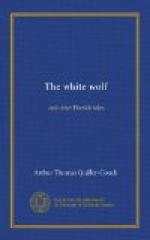“My dear sir,” said I, “don’t be in a hurry. Serve out your time among the barbarians at school, and I’ll promise you in time your father’s respectful astonishment.”
These were my two boys; and you may wonder why I always think of them together. I do, though: and, what is more, I find that together they help to explain to me my country’s greatness.
THE SENIOR FELLOW.
There is at Oxford a small college, with a small bursar’s garden that in spring is ablaze with laburnum and scented with lilac; and in the old wall of this garden, just beneath the largest laburnum-tree, you may still find a stone with this inscription: “Jesus have mercy on Miles Tonken, Fellow. Anno 1545.”
This college, in the days when I knew it, had three marks of distinction:—It turned out, on hunting mornings, more “pinks” for its size than any other in Oxford; its boat was head of the river; and its Senior Fellow was the Rev. Theobald Pumfrey, who knew more of Athenaeus than any man in the world. He seldom lectured; but day by day, year after year, sat in the window above this same small garden, and accumulated notes for the great edition of his pet author that some day—nobody quite knew when—was to make him famous. He was the son of a Cumberland farmer; had come up to the University from a local grammar-school; and since then (it was said) had revisited his native village twice only—to bury his father and mother. His mother’s death— and that had happened five-and-twenty years before—left him without a single relative on earth: nor could he be said to have a friend, even among the dons. He rose early, took a solitary walk in the parks, and would spend the rest of the day at his desk by the window. People marvelled sometimes why he had taken Holy Orders. It was hinted that his scout knew, perhaps; but, if so, his scout never divulged the reasons.
The scholar was a man, nevertheless; had a humorously wrinkled mouth, and an eye that twinkled responsive to a jest; and was the best judge of wine in Oxford. On the strength of this undeniable gift the dons had long since elected him steward of Common-room; and he valued the responsibility, abstaining from tobacco—which he loved—to keep pure his taste for vintages, and preserve a discriminating palate among sweets. An utterance of his would hint that even his avoidance of physical exercise was a matter of duty.
“A man,” he said, “may work his body, may work his head, and may enjoy his dinner. Any two of these things he may do, but not all three. For me, I wish to work my head, and must enjoy my dinner.” And once, when I dined with him, it was made clear to me that his life was ordered after a plan. It was a summer evening, and he held a glass of claret against the sunset. “Wife and children!” he cried suddenly, “wife and children!” Then, with a wave of his left hand from the claret to the still lawn below us and the lilacs, “These are my wife and children!”




